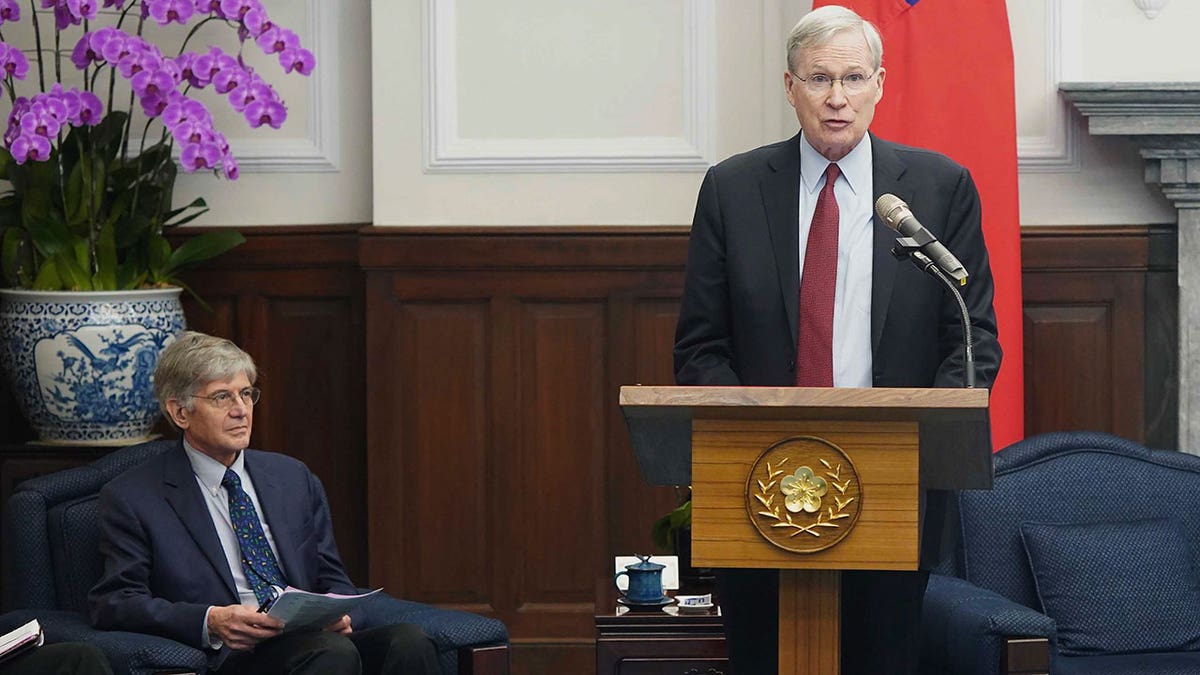Fox News Flash top headlines for January 15
Fox News Flash top headlines are here. Check out what's clicking on Foxnews.com.
- Retired U.S. officials met with Taiwanese President Tsai Ing-wen, praising Taiwan's democratic processes that elected a new president and legislature.
- Former national security adviser Stephen Hadley said Taiwan's democratic success story is based on transparency, rule of law and respect for human rights.
- The visit reaffirmed America's commitment to Taiwan amid Nauru switching diplomatic recognition from Taiwan to China.
Retired U.S. officials met with Taiwanese President Tsai Ing-wen on Monday and praised the island’s democratic processes under which it elected a new president and legislature over the weekend in defiance of China’s claim of sovereignty over Taiwan and threat to annex it by military force.
"Taiwan’s democracy has set a shining example for the world, a democratic success story based on transparency, the rule of law and respect for human rights and freedoms," former national security adviser Stephen Hadley said.
America’s commitment to Taiwan is "rock solid," he said.
The visit came as the Pacific Island nation of Nauru announced it was switching diplomatic recognition from Taiwan to China, reducing Taiwan's number of diplomatic allies to just 12.

Former U.S. Deputy Secretary of State James Steinberg, left, looks on as former U.S. National security advisor Stephen Hadley speaks during a meeting with Taiwan's President Tsai Ing-wen, unseen, at the Presidential Office in Taipei, Taiwan on Jan. 15, 2024. (ADen Hsu/Pool Photo via AP)
Taiwan's Foreign Ministry said it was withdrawing its diplomats from the tiny nation "in the name of national dignity."
Taiwanese voters on Saturday elected current Vice President Lai Ching-te as the new president, a move likely to prompt China to maintain its military, diplomatic and economic threats against the island.
Hadley was joined by former Deputy Secretary of State James B. Steinberg, who affirmed bipartisan support for Taiwan "based on our unofficial but warm relationship, our insistence on exclusively peaceful means to address the cross (Taiwan Strait) issues, the importance of dialogue and the avoidance of unilateral efforts to change the status quo."
Their delegation later met with Lai and Vice President-elect Bi-khim Hsiao, Taiwan's former de facto ambassador to the U.S.
"Democracy and freedom are the most valuable assets of the Taiwanese people," Lai said. "It is also the core value of Taiwan and the United States and the basis of the long-term partnership between Taiwan and the United States."
"Although China continues to intrude on Taiwan with military and other gray zone activities, Taiwan is still able to deal with it calmly and work together with the United States and other international partners who share the same philosophy to maintain the status quo of stability in the Taiwan Strait," Lai said. Gray zone activities refer to the application of military and socio-economic pressure that comes short of outright armed conflict.
Tsai said Taiwan's "need to continue to progress and move forward remains unchanged."
"We hope that Taiwan-U.S. relations continue to advance and serve as a key driving force in regional and global prosperity and development," she said.
Despite having cut official diplomatic relations with Taiwan in 1979, the U.S. remains the island's chief diplomatic ally and source of military hardware and intelligence.
Taiwan’s presidential and parliamentary elections have always been a source of contention between the two sides, which separated during a civil war in 1949, amplifying the difference between Taiwan's free-wheeling democratic process and China's Communist Party authoritarian rule.
That divide is a major flashpoint in U.S.-China relations that potentially risks leading to an actual war in the future, accentuated by China's claim to virtually the entire South China Sea and competition for markets and diplomatic influence in the Asia-Pacific region.
Lai's victory was a setback for China’s efforts to bring Taiwan under its control. His Democratic Progressive Party advocates maintaining the status quo of de facto independence, under which the island's 23 million people carry Taiwanese passports, maintain their own government and defense and issue their own currency, but are denied recognition at the United Nations in deference to China.
China has refused to acknowledge the result of the election, which left the legislature closely divided between the DPP and the Nationalists, also known as the Kuomintang or KMT. China's Foreign Ministry said in a statement on the election that "the Taiwan question is China’s internal affair" and "the basic fact that ... Taiwan is part of China will not change."
WHAT TAIWAN'S ELECTION TELLS US ABOUT CHINA AND 2024
Taiwan said Beijing's position "is completely inconsistent with international understanding and the current cross-strait situation. It goes against the expectation of global democratic communities and goes against the will of the people of Taiwan to uphold democratic values. Such cliches are not worth refuting."
U.S. Secretary of State Antony Blinken congratulated Lai on his victory. China's Foreign Ministry said that message "sends a gravely wrong signal to the ‘Taiwan independence’ separatist forces" and goes against a U.S. commitment to maintain only unofficial ties with Taiwan.
Lai’s victory means the Democratic Progressive Party will hold the presidency for a third four-year term, following eight years under Tsai. Lai won a three-way race for president with 40% of the vote, less than the clear majority Tsai won in 2020. He will take office in May.










































